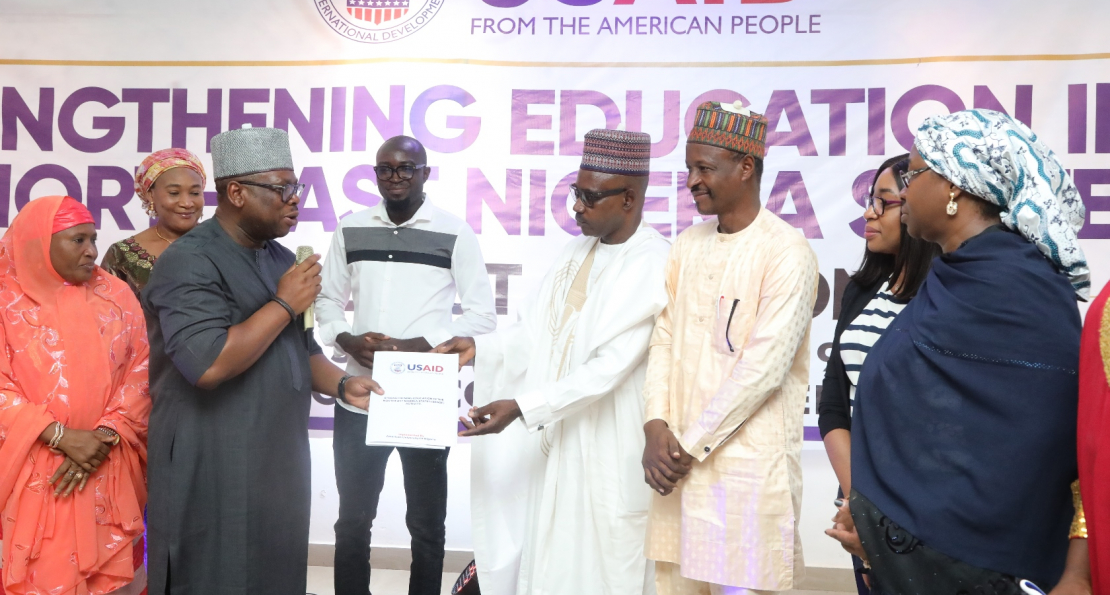The USAID-funded Strengthening Education in the Northeast Nigerian States (SENSE) has ended its active phase but the positive impact will be felt in Adamawa and Gombe states for many years to come. The Atiku Institute for Development of the American University of Nigeria implemented the USAID-SENSE project in the two target states. The intervention had the objective of strengthening the capacity of the basic public education system by providing access and delivery of quality early-grade reading to learners in Primary grades 1, 2, and 3 in the two states.
USAID-SENSE was launched in March 2019 and in three years the implementers developed packages for the two states which contained more than 5.2 million copies of educational reading materials produced with USAID's evidence-based early grade reading methodology. Using global best practices, the intervention achieved great innovations and brought a change in the delivery of standard and quality education to early-grade learners.
This success of the SENSE activity was achieved through the diligent implementation of USAID's education strategy of utilizing key evidence-based interventions to address some of the challenges facing the education sector in Nigeria, such as the lack of local language teaching and learning materials and poor early grade teaching skills of lower primary teachers, lack of parental engagements and poor education managers' skills in providing supportive supervision to teachers.
The objectives of the SENSE activity which were highlighted by the project's Chief of Party Mr. Audu Liman include developing the capacity of 200 Education Managers in teacher professional development activities, training 5,000 teachers, supporting 200 School-based Management Committees, and providing 200,000 teaching and learning materials to learners in primary grade 1, 2 and 3. Other objectives were to increase the percentage of learners targeted for US government assistance at the end of grade 2 by 15%.
Mr. Liman noted that in three years of implementation, SENSE exceeded all of its major targets. These achievements include;
Providing access and delivery of the quality early-grade reading intervention to 731,164 learners in Primary grades 1, 2, and 3 across 335 schools. And in three years, the SENSE Activity has been shown to have improved the reading abilities of over 400,000 learners in primary grades 1, 2, and 3 and increased the percentage of learners targeted for US government assistance by 23% in Adamawa and Gombe States.
Providing capacity-building training for 659 Education Managers. Trained 9,711 teachers across both states in early grade reading strategies, to develop their teaching skills and were equipped with Resource Centers in various local governments for professional development.
AUN President, Professor Attahiru Yusuf, explained that education being a priority, it is the responsibility of every stakeholder in the Nigerian society to have a significant focus on the Education System. He justified USAID’s intervention which he noted is well-designed and implemented. The Professor of Entrepreneurship appreciated USAID for bringing this program to this part of the world, and entrusting AUN with the task of implementation and assured USAID representatives that they will work hard to ensure it is sustained and continues to thrive because at AUN sustainability is the keyword.
Stakeholders concur with Professor Attahir Yusuf that USAID-SENSE has introduced three innovations that are now part of the two states' education programs. These innovations include:
- A site-based, data-driven teacher professional development approach, that utilizes classroom observation data to inform in-service teacher training and a coaching and mentoring strategy that is supportive of teachers,
- A School-based management committee school support model approach where parents are engaged in teaching and learning to help reduce teacher and learner absenteeism, and
- An Education Management System that is inclusive of the inputs from the school and local education authority levels so that actual challenges from the lower levels are given attention.
Beneficiaries of the SENSE activity, teachers, SSOs, SBMCs, and Education Secretaries took time to share testimonies on how SENSE had impacted them in the areas of provision of reading and learning materials, improved methods of teaching, changed the method of supervision from fault-finding approach to developing a cordial working relationship, carrying education secretaries on board during activity implementation and improved pupils' ability to read the Hausa language well.
Reported by Mary Andepam


